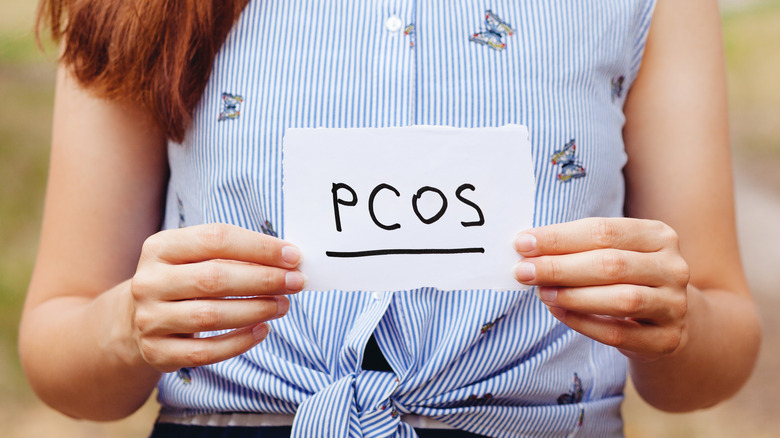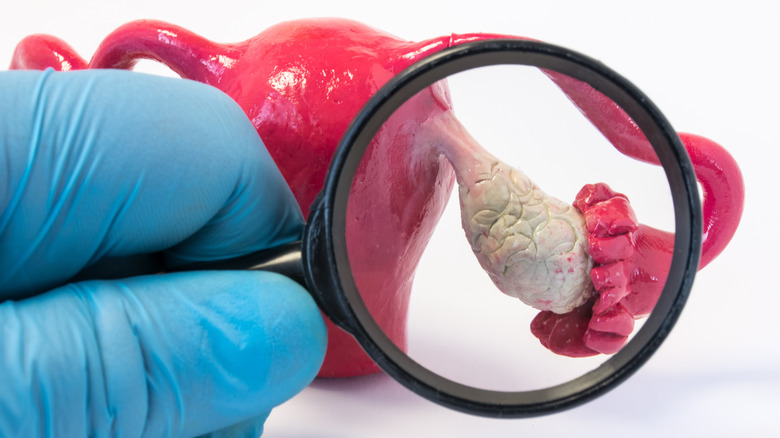Can Where You Live Affect The Severity Of Your PCOS Symptoms?
According to the Center for Disease Control, roughly 5 million people of reproductive age in the U.S. have polycystic ovary syndrome (PCOS). However, despite this extraordinary number, not enough attention is given to it.
PCOS occurs when cysts grow on the outer edge of the ovaries. These cysts are filled with immature eggs called follicles that don't release eggs on a regular basis, resulting in both menstruation cycles and fertility being affected (via Mayo Clinic). It can also mean that the body has too much androgen in it; a hormone that can lead to excess body hair — hirsutism — or, on the flip side, baldness.
Because PCOS isn't discussed often, people have taken to TikTok and other platforms to raise awareness. Recently a woman named Annette with PCOS grew out her beard — the result of androgens in her body — then shaved it to raise money for the PCOS charity Verity (via BBC). "So many women feel alone and I want them to know they're not," Annette told the BBC.
While Annette did make other women with PCOS feel less alone, the fact remains that the disorder gets under .01% of government funding, U.S. News reported. That means that research is scarce and advancements in treatment are lacking. Because of this, it's a big deal when PCOS-related findings are published. It not only gets doctors one step closer to understanding PCOS, but it also gives those who have it hope that proper treatment will, eventually, be on the way.
PCOS can be affected by environment
A recent study published in the Journal of Clinical Endocrinology and Metabolism found a correlation between PCOS and regional variation. The researchers took Black and white women from both Alabama and California to prove their hypothesis. What they found was that 85% of those with PCOS in Alabama were more likely to experience the side effects of excess body hair, while in California, that percentage was down to 73.
"What the research tells us is that it is thought to arise from genetic and environmental factors; with inflammation, elevated cortisol, and insulin resistance at the driving seat alongside gut dysbiosis, an unstable circadian rhythm, and exposure to endocrine disruptors (e.g. plastics and products)," nutritionist and medical advisory board member for the PCOS Awareness Association Hannah Alderson told Medical News Daily. "These factors interact to cause the features of PCOS to present themselves."
This isn't to suggest that the color of one's skin plays a role, but rather the genes that are more likely to be in those who live in different parts of the country. For example, Black people in the South are more likely to have African ancestry than Black people in other parts of the country, including the Northeast and West coast. There's also a difference in food that's available in stores in Alabama versus California, leading researchers to hypothesize that this could be a factor too (via Journal of Clinical Endocrinology and Metabolism).
How this affects those with PCOS
Although no one expects people in the South with PCOS to move to the Northeast or California, it does explain things a bit. But while the findings give some insight into what changes people in the South can make to keep their PCOS symptoms in check, in some ways, the cards are stacked against them.
For starters, diet changes can be a huge help, but sadly, Alabama is number four in the top five unhealthiest states in the United States. California, however, ranks in the top five healthiest states (via Fortune). Naturally, economic background is a factor and Alabama is among the top 10 states with the lowest household income, coming in fifth, as World Population View reported.
But even small changes, within a budget, can have positive results. Ditching excess carbs and coffee, eating more fiber and whole foods — fruits and vegetables in their unprocessed state — and adding supplements and herbs to your diet can help (per Healthline).
"After these findings, we are starting to look into the potential reasons for these findings," the senior author of the study by the Journal of Clinical Endocrinology and Metabolism, Professor Margareta D. Pisarska, told Medical News Today. "We are interested in focusing on diet, exercise/sedentary lifestyles, and social determinants of health."
At the moment, there is no cure for PCOS; only treatments. However, having the knowledge of what helps and what can exacerbate the syndrome and its side effects is a step in the right direction.


